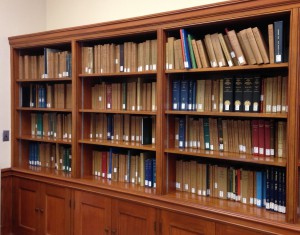 Robert Henry Eddy was a life member of NEHGS who died in 1887 and bequeathed a substantial sum of money to the Society.* Mr. Eddy had been an architect, civil engineer, and in later life, a very successful patent attorney. In 1902, NEHGS used $20,000 of the Eddy bequest to establish the “Eddy Town-Record Fund, for the sole purpose of publishing the Vital Records of the towns of Massachusetts.” This fund would become the basis of a major project to preserve early Massachusetts vital records.
Robert Henry Eddy was a life member of NEHGS who died in 1887 and bequeathed a substantial sum of money to the Society.* Mr. Eddy had been an architect, civil engineer, and in later life, a very successful patent attorney. In 1902, NEHGS used $20,000 of the Eddy bequest to establish the “Eddy Town-Record Fund, for the sole purpose of publishing the Vital Records of the towns of Massachusetts.” This fund would become the basis of a major project to preserve early Massachusetts vital records.
Beginning in 1850, the Commonwealth of Massachusetts had required, by law, that all town clerks record vital records in their towns and send a copy of those records to the state for safekeeping. Prior to that time, Massachusetts towns and cities kept their own records, which were occasionally published by the town or by other interested parties. But the records of the great majority of towns were unique and at risk of damage or destruction. NEHGS recognized the significance of those records, and through the efforts of members Edmund Dana Barbour, William Prescott Greenlaw, and Charles Sidney Ensign, influenced the Massachusetts legislature to pass “An Act to provide for the Preservation of Town Records of Births, Marriages and Deaths to the Year Eighteen Hundred and Fifty.”
The so-called “Vital Records Act” provided for the purchase, by the Secretary of the Commonwealth, of “500 copies of the vital records of any town in Massachusetts, whenever such record should be printed and verified in the manner required by the Commissioner of Public Records and the Board of Free Library Commissioners, acting jointly, and the work should appear to them to have been prepared with accuracy, provided that not more than $15,000 should be expended in one year.” Qualifying record books would be purchased by the state at a fixed rate per page. The state-purchased volumes were then donated to public offices, libraries, and historical societies.
Between 1902 and 1918, when the act was repealed “as a measure of war economy,” the vital records of 149 Massachusetts towns were published. The primary organizations involved were NEHGS (82 towns); the Systematic History Fund, published by Franklin P. Rice (34 towns); Essex Institute (21 towns); and the Topsfield Historical Society (11 towns). Since 1918, records of 41 additional towns have been published, the most recent being the NEHGS Vital Records of Springfield, in 2003.
Today, the Massachusetts Vital Records to 1850 database available on AmericanAncestors.org includes all those towns, plus records from manuscripts in the NEHGS R. Stanton Avery Special Collections, and records donated by other organizations, totaling 210 towns in all. A pdf list of the towns can be found here. This database was originally released in 2001 and has been revised many times since then to include additional towns, complete primary name information, and images of all 92,163 pages included.
Best of all, this 2.6 million record database is searchable by anyone, at no cost, on AmericanAncestors.org. So the answer to my question is, Robert Henry Eddy was the first of many generous NEHGS members to help make the early vital records of Massachusetts available to all.
*NEHGS is a non-profit organization and derives about 40% of its operating expenses from membership fees. The majority of the balance is made up through contributions from generous individuals who are interested in preservation of genealogical records.
Share this:
About Sam Sturgis
Sam was born and raised in Ann Arbor, Michigan. He received B.S. and M.S. degrees in Psychology from Eastern Michigan University and worked as a Human Factors researcher in automotive safety for 13 years. He entered the field of commercial software development in 1983 and acted as software developer and development manager at Wang Laboratories and The Foxboro Company. Sam joined the NEHGS staff in 2005. Sam's interest in genealogy began shortly after moving to Massachusetts, when he and his family chanced upon the Sturgis Library in Barnstable, during a vacation on Cape Cod. There he discovered that he is a descendent of the Sturgis family that settled on Cape Cod in the 1630's. Sam and his wife Gail live in Medway, Massachusetts. They have two grown children: Katie, a Registered Nurse in Wrentham, and David, a software developer in Somerville.View all posts by Sam Sturgis →